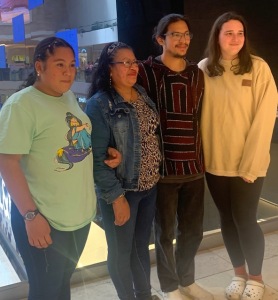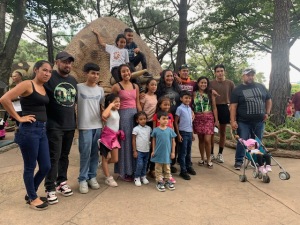 Sitting across from Crystel who was with her ‘squad’ as she would come to call her eleven nieces and nephews, Jody and I watched her draw the children to her. A magician she was. Instead of pulling scarves one by one out of a hat she charmed each child and tenderly tucked them around her heart. The children, enchanted and mesmerized, enveloped her, this aunt from the United States. This aunt they were meeting for the first time.
Sitting across from Crystel who was with her ‘squad’ as she would come to call her eleven nieces and nephews, Jody and I watched her draw the children to her. A magician she was. Instead of pulling scarves one by one out of a hat she charmed each child and tenderly tucked them around her heart. The children, enchanted and mesmerized, enveloped her, this aunt from the United States. This aunt they were meeting for the first time.
Where was Juan? Alarmed, I stood up and quickly scanned the dining room. Eight tables had been strung together to accommodate Crystel’s twenty-five Guatemalan relatives. Fried chicken, burgers, and pizza permeated the air. Chatter of families, scraping chairs, little kids running.
Of course. He was sitting directly across from Crystel. Silent, strong, and loyal he was smiling broadly at her playfulness. That morning Crystel insisted that Juan sit next to her in the van on the way to meet her birth family. Since both are adopted, only he could understand the anxiety of meeting strangers connected by blood and the intense three-hour reunion that would occur.
Adopted together at seven and eight months old, they were only six weeks apart in age. Now, both 21, they have had a lifetime of knowing each other. Juan would remain nearby, available. Crystel would do the same for him one week later when it was his birth family reunion.
“Jody, I’m going to ask Mayra if she wants to sit closer to Crystel,” I said. Mayra, Crystel’s birth mom, was sitting quietly next to Juan. Mayra shook her head, no. She encircled her arm in front of her. “This.” Her eyes brimming, “I love watching all this.”
I understood. I, too, have given up an infant in adoption. I imagine meeting my birth son. Sitting across from him, looking closely for resemblance in the eyes, face, and mannerisms. I’d want to intimate who this child is. Ask, Did you have a good life?
 Mayra had met Crystel twice before. When she was nine years old and again at eleven. Jody and I had initiated the birth family search and made the reunions possible. After the second visit we were notified by Mayra that Crystel’s birth father had threatened to kidnap her and return her to Guatemala. Crystel was the 8th child in a family of 9 children from the same biological father. She was the only child given up for adoption. Every time Mayra was pregnant, the father said the child was not his. After learning about Crystel from our visit, he threatened he would claim her back because he didn’t want any of his children to grow up apart. He was going to claim her as his own. Jody and I knew this threat to be real. Her estranged birthfather was living illegally in Chicago. A drive of 6 hours and 3 minutes separated us from him. Or was he right down the street, waiting to grab our daughter?
Mayra had met Crystel twice before. When she was nine years old and again at eleven. Jody and I had initiated the birth family search and made the reunions possible. After the second visit we were notified by Mayra that Crystel’s birth father had threatened to kidnap her and return her to Guatemala. Crystel was the 8th child in a family of 9 children from the same biological father. She was the only child given up for adoption. Every time Mayra was pregnant, the father said the child was not his. After learning about Crystel from our visit, he threatened he would claim her back because he didn’t want any of his children to grow up apart. He was going to claim her as his own. Jody and I knew this threat to be real. Her estranged birthfather was living illegally in Chicago. A drive of 6 hours and 3 minutes separated us from him. Or was he right down the street, waiting to grab our daughter?
Boxes of Pollo Campero and cheese pizza materialized on the tables. A whirl of activity, Crystel’s brothers and sisters, ranging in ages from 18-34, sprang into action, doling out plates of fried chicken and small bags of fries. Hands reached for slices of pizza. Bottles of soda were poured into smaller cups. Our voices filled the space as we sang “Feliz Cumpleanos” to Juan’s girlfriend, Aryanna. Celebrating her 19th birthday, she blushed, and accepted tres leches, a sponge cake soaked in a sweet milk mixture, and topped with fresh whip cream and a cherry.
Mayra approached Jody and me. Standing next to her, waiting to interpret, was Freddy, Crystel’s eighteen-year-old brother’s boyfriend. He was the only person in their party that was bilingual. Mayra reached down for our hands, brought them together and cupped them in her palms, cradling us. “I can see that my daughter is happy. That you took great care of her,” she said in a burst of Spanish. Tears fell onto her cheeks. “I’m glad that you … you … were the ones that adopted her.” Jody and I teared up. Our eyes were steady on Mayra’s soft round face. Mayra made no attempt to stop crying or to wipe her tears away. Her hands tightened around ours. She continued in her emotion-rich voice, “You … you … brought her back.” She placed her hands to her heart.
I looked over at Crystel. Sisters, brothers, nieces, and nephews gathered around her. Loud animated laughter. She wasn’t ever ours to keep, I thought. Ever since we adopted her our goal was to bring her back, to her birth country, her birth family. Everything Jody and I have done has been to that end.
She came home to us at seven months old, underweight, and developmentally delayed. The doctors could treat her feeding issues, scabies, and the viral infection. What she needed most of all was the will to live. Jody and I nurtured and loved her, and she found that will within herself. Speech therapy for an articulation disorder addressed her inability to correctly produce speech sounds. Until she didn’t need it or wouldn’t allow it, Juan interpreted for her. They both attended Spanish dual language school in elementary, middle, and high school.
I turned to face Mayra and took a sharp breath. I wasn’t sure if it was the appropriate time to ask but I wanted to know. “What about her birth father?” She brandished the air in front of her. “Don’t worry about him. Erase him from your thoughts.”
Crystel was 18 when she asked Jody and I about her birth father. I showed her his Facebook page. “Why does he have pictures of me on there?” she asked. “He’s been stalking you,” I said. “When you were in fifth grade, he threatened to kidnap you.” She pondered. “I always wondered why my name on class rosters had a note saying I wasn’t to have any visitors.” I explained further, “Schools, law enforcement, friends, neighbors, aunts and uncles all knew. It’s what we did to keep you safe.”
 Jody and I have noticed how Crystel has taken responsibility for her own wellbeing. She completed her college sophomore year in Hawaii as a national exchange student, successfully navigating school, friendships, surfing, and a job. At the end of the school year, she traveled independently to Vietnam and Korea. She and I had just completed a month-long homestay in the mountains of Guatemala to take Spanish classes. After school, Crystel climbed volcanoes and managed other excursions without me. She is an accomplished adult. The threat is no longer viable.
Jody and I have noticed how Crystel has taken responsibility for her own wellbeing. She completed her college sophomore year in Hawaii as a national exchange student, successfully navigating school, friendships, surfing, and a job. At the end of the school year, she traveled independently to Vietnam and Korea. She and I had just completed a month-long homestay in the mountains of Guatemala to take Spanish classes. After school, Crystel climbed volcanoes and managed other excursions without me. She is an accomplished adult. The threat is no longer viable.
Voices became spirited, higher pitched around the tables. Talk of rollercoasters. Mundo Petapa Irtra amusement park where we were was the perfect place for this reunion. Rides, entertainment, playgrounds, restaurants, and a walking zoo were spread over the grounds. Chairs were pushed back. Cleanup started. A trail of children to the bathroom.
Mayra took this moment to walk around the dining area to sit next to Crystel. Both shifted in their chairs to greet each other. Mayra laid her hand on Crystel’s arm resting on the table. Though Jody and I couldn’t hear the conversation, I imagine Mayra telling Crystel that it had been a difficult time in her life when she surrendered her in adoption. That she missed her every single day. How she carried her in her heart. What a beautiful woman she was. Both had a ready smile and bubbly laugh that leaned toward boisterous. One could easily discern that they were mother and daughter. The same high forehead, cheekbones, distinctive eyebrows, narrow chin, and small lips.
Observing Crystel and Mayra, my eyes glistened. I swiped at my tears. My tendency is to cry when I am moved by the expression of love. I wasn’t raised with love or safety. I was sexually abused and neglected on a constant basis. There was violence. What I wanted for myself, Jody, and our children, was to see what continuous love would look like in a child. I saw the answer in Crystel. She was full, meeting with her birth mom, siblings, nieces, and nephews. She knew where she came from. She knew love was abundant. Jody and I had only gained by this reunion. We had Crystel for 21 years and all her firsts. She’d be ours for the rest of our lives. She’d also have her birth mom, siblings, and her squad.
Daughter, did you have a good life? Mayra knew the answer.











![9781623364069_p0_v1_s260x420[1]](https://wordsisters.files.wordpress.com/2014/07/9781623364069_p0_v1_s260x4201.jpg?w=199&h=300)



